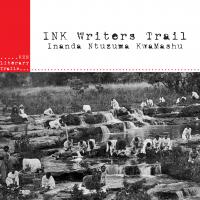Posted on November 6, 2009

KZN Literary Tourism started life as an National Research Foundation (NRF) funded project at the University of Kwa-Zulu Natal, looking at writers and place and the relatively new phenomenon (at least in South Africa) of literary tourism. Literary Tourism is tourism that deals with places and events from fictional texts as well as the lives of their authors. This could include following the route a fictional character charts in a novel, visiting particular settings from a story or tracking down the haunts of a novelist. Literary tourists are specifically interested in how places have influenced writing and at the same time how writing has created place.
During this initial phase, the project produced a database of writers associated with the province and developed their first writer's trail, the Rider Haggard Literary Trail. Since then the project has grown to become the main documenter of literary heritage in the province. Post-NRF funding, KZN Literary Tourism has relied on strategic partnerships with the eThekwini Municipality, sponsorship from business and grants from the National Arts Council to produce four more writers trails. These are Paton's Pietermaritzburg, the Grey Street Writers Trail, the Cato Manor Writers Trail and, most recently, the INK Writers Trail.
The trail pamphlets follow a similar format, with a brief history of the area given followed by short biographies of the writers and then a list of places to visit. Each stop on the trail is associated with a writer or a text and has a reading related to it - the idea being that you read from the relevant texts at each respective stop. A map is included at the back of the trail pamphlet.
The INK Writers Trail, launched this month, was a joint responsible tourism venture between KZN Literary Tourism and the Inanda, Ntuzuma and KwaMashu (INK) Area Based Management. INK is situated about 25km inland from Durban and forms part of the eThekwini Municipality, with the trail an important heritage tourism initiative for the area. The trail includes important cultural and historical sites such as the Phoenix Settlement, the Ohlange Institute and Inanda Seminary and writers such as Mandla Langa, Sita Gandhi, John Dube, Angelina Sithebe, Ellen Kuzwayo and Mewa Ramgobin. As part of the trail development, community guide training was conducted on the writers associated with the area and heritage tourism in general.
Information produced from the development of trails is fed into KZN Literary Tourism's website, a successful component of the project. The original database of KwaZulu-Natal (KZN) writers was incorporated into the website and expanded on, now with over 80 author profiles. Digital versions of the trail pamphlets are available online, along with audio recordings of the trails and readings by writers. Book reviews and author interviews sit side by side with scholarly research on literary tourism. The entire website is self-funded through advertisers, mainly publishing companies.
KZN Literary Tourism is currently working on it sixth literary trail, the Midlands Writers Trail. For more on the project, visit www.literarytourism.co.za
The Ulwazi Programme is the eThekwini Municipal Libraries' indigenous knowledge management programme, which uses Web 2.0 technologies to actively record and share the contemporary history and culture of the area. Started in 2007, the programme seeks to fulfill the mandate laid out by national government for libraries to aid in the preservation of Indigenous Knowledge Systems. The policy states that libraries should:
- facilitate indigenous and local community information access, based on their own identified needs;
- provide opportunities for indigenous and local communities to actively record and share their contemporary history, culture and language with both Indigenous and non-Indigenous peoples; and
- use new technology creatively to support Indigenous and local community development.
The Programme does this through running the Ulwazi Memory, a wiki where content (articles, photographs and audio recordings) is submitted by local community members using the public libraries infrastructure, in particular their computers and internet access. A wiki is a browser-based collaborative writing environment to which anyone can contribute without having web programming skills. It allows users to add and edit content independently while also keeping track of all changes made. Ulwazi uses the MediaWiki open-source framework to run the database, the same software used to run Wikipedia.
Community participation in the Ulwazi Programme ensures the collecting, recording, preserving and sharing of local knowledge, while the library focuses on custodianship of the information resource, providing database management, training and support. Content is collected under three broad categories - Culture, Environment and History - with subcategories providing further classification. Additional sub-categories can be created when needed. Articles can and have been submitted in English and isiZulu, which serves another important function of the programme - creating local, relevant content on the internet in isiZulu, the lack of which results in a disinterest in digital resources and poor digital literacy in local communities.
Field-workers from the peri-urban and township areas of the Municipality - the Programme currently operates in Umlazi, Inanda, Ntuzuma, KwaMashu and Mbumbulu - are taught how to record oral histories, use audio-visual equipment and create pages and upload material to the wiki. They then go out into their communities and collect stories while at the same time promoting the Programme and passing on their training to interested people.
Seed funding was provided by Imagine Durban (www.imaginedurban.org), a council-led project on integrated and sustainable long-term planning for the city. The success of the pilot project resulted in its adoption as a strategic project and subsequent funding by the Ethekwini Libraries & Heritage Department.
Read more at www.ulwazi.org and http://wiki.ulwazi.org